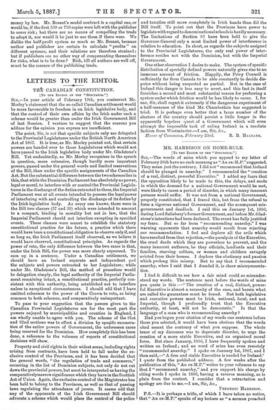LETTERS TO THE EDITOR.
THI CANADIAN CONSTITUTION.
170 THE EDITOR OY THE "SPECTATOR.")
Sin,—In your article of February 19th, you controvert Mr. Morley's statement that the so-called Canadian settlement would be more favourable to freedom in an Irish legislative body, and that the control of their own affairs by the Irish under such a scheme would be greater than under the Irish Government Bill of last Session. I venture to suggest that the reasons yon adduce for the opinion you express are insufficient.
The point, Sir, is not that specific subjects only are delegated to the Provincial Legislatures under the British North American Act of 1867. It is true, as Mr. Morley pointed out, that certain powers are handed over to those Legislatures which would not have passed to the Irish legislative body under Mr. Gladstone's Bill. Yet undoubtedly, as Mr. Morley recognises in the speech in question, more extensive, though hardly more important powers, passed under the general words and limited reservations of the Bill, than under the specific assignments of the Canadian Act. But the substantial difference between the two schemes lies in -this, that while the Dominion Parliament has absolutely nopower, legal or moral, to interfere with or control the Provincial Legisla- tures in the discharge of the duties entrusted to them, the Imperial Parliament was at all events intended to possess the legal power of interfering with and controlling the discharge of its duties by the Irish legislative body. As every one knows, there were in the Bill two clauses (37 and 39) which were intended to amount to a compact, binding in morality but not in law, that the Imperial Parliament should not interfere excepting in specified events. These clauses were meant to establish the statutory constitutional practice for the future, a practice which there would have been a constitutional obligation to observe only if, and :so long as, the Irish Parliament itself observed, as we believe it would have observed, constitutional principles. As regards the power of veto, the only difference between the two cases is that, under the Irish Bill, the power was more clearly expressed. To sum up in a sentence. Under a Canadian settlement, we should have an Ireland separate and independent qud the subjects and powers entrusted to her Legislature ; while under Mr. Gladstone's Bill, the method of procedure would be delegation simply, the legal authority of the Imperial Parlia- ment remaining intact, a constitutional practice, perfectly con- sistent with this authority, being established not to interfere unless in exceptional circumstances. I should add that I have omitted reference to the power of the Crown to veto, as being common to both schemes, and comparatively unimportant.
To pass to your suggestion that the powers given to the Canadian Provincial Legislatures are for the most part the powers enjoyed by municipalities and counties in England, I am wholly unable to agree with you. The scheme of the 91st and 92nd sections was to effect a division by specific enumera- tion of the entire powers of Government, the unforeseen cases being reserved for the Dominion. How completely this has been done, a reference to the volumes of reports of constitutional decisions will show.
Property and civil rights in their widest sense, including rights arising from contracts, have been held to fall under the ex- clusive control of the Provinces, and it has been decided that the general words, "the regulation of trade and commerce," occurring in the list of Dominion subjects, not only do not cut down the provincial powers, but must be interpreted as having the comparativelyinarrow significance which they have in the Scottish Act of Union. Again, the exclusive control of the Magistrates has been held to belong to the Provinces, as well as that of passing laws regulating the attendance of jurors. It seems odd that any of the opponents of the Irish Government Bill should advocate a scheme which would place the control of the police and taxation still more completely in Irish hands than did the Bill itself. To point out that the Provinces have power to legislate with regard to denominational schools is hardly necessary. The limitations of Section 93 have been held to give the Governor-General only a moat limited power of interference in relation to education. In short, as regards the subjects assigned to the Provincial Legislatures, the only real power of inter- ference resides not with the Dominion, but with the Imperial Government.
One other observation I desire to make. The system of specific distribution of specially defined powers naturally gives rise to an immense amount of friction. Happily, the Privy Council is sufficiently far from Canada to be able constantly to decide dis- putes without being suspected as partial. But in the case of Ireland this danger is less easy to avert, and this fact in itself furnishes a second and most substantial reason for preferring a system under which friction would be less likely to occur. I, for one, Sir, shall regret it extremely if the dangerous experiment of a half-measure of the kind Mr. Chamberlain has suggested is tried. It is perhaps even better that a large number of the electors of the country should persist a little longer in the apparently hopeless quest of a Government which will even attempt the impossible task of ruling Ireland. in a resolute fashion from Westminster.—I am, Sir, SA., House of Contmona, February 23rd. R. B. HALDANE.


































 Previous page
Previous page